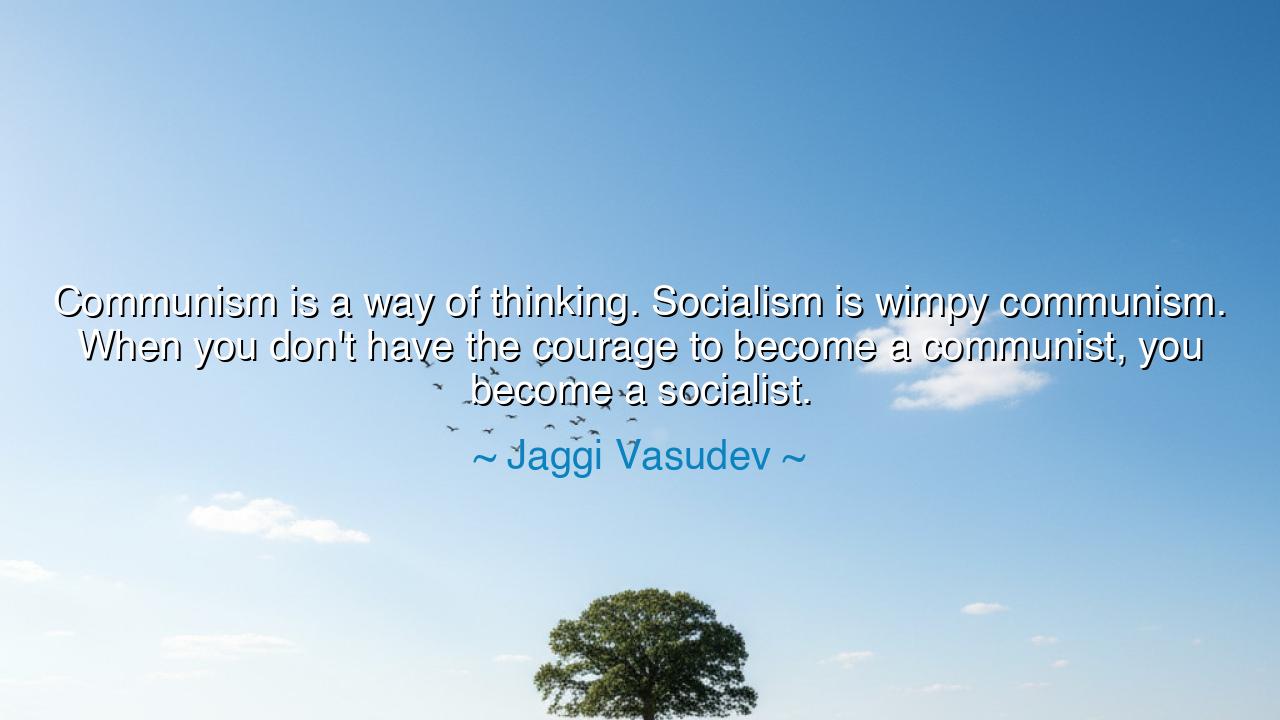
Communism is a way of thinking. Socialism is wimpy communism.
Communism is a way of thinking. Socialism is wimpy communism. When you don't have the courage to become a communist, you become a socialist.






In the voice of one who traverses both the outer world and the inner, Jaggi Vasudev offers a startling claim: “Communism is a way of thinking. Socialism is wimpy communism. When you don’t have the courage to become a communist, you become a socialist.” This is not a doctrine, but a provocation — a mirror held before the mind to reveal how we compromise ideals when fear weighs heavily upon us. At its heart, this saying unmasks a tension between conviction and pragmatism, between the aspiration for radical transformation and the safer lodges of moderated reform.
To begin, note how the phrase “Communism is a way of thinking” elevates it beyond political labels. Vasudev suggests communism is not merely a system of governance, but a conviction about oneness, equality, and shared being. As such, it is an ideal that challenges the boundaries of individualism itself. When he says “Socialism is wimpy communism,” he means that socialism, in his framing, is the watered-down version of those convictions — the attempt to bring communal values into existing structures without confronting their deeper roots. And in those who lack “the courage to become a communist,” socialism becomes their refuge — a softer shade of the original vision.
To understand how this tension plays out, one may look to the history of revolutionary movements, where ideals are often broken on the wheel of compromise. Take the Russian Revolution: the Bolsheviks aspired to a radical overturning of ownership and power, while later leaders admitted plaques of moderation and state control. The original vision of communal ownership yielded to a bureaucracy that bore more resemblance to centralized authority than free communes. In that transformation, many might say they traded the courage of the ideal for the safety of management. History, then, bears witness to how ideas become diluted when fear or expedience moves in.
And yet Vasudev’s words should not be taken as a defense of bloodshed or dogma, but as a spiritual metaphor. In Eastern thought — from which he often draws — the deeper impulse toward unity or non-separateness is the root from which all just systems should grow. If one holds the ideal of communal consciousness, socialism might be the stepping stone — but not the endpoint. The “wimpiness” he names is the failure to inhabit the deeper truth fully: to act with integrity from the root, not merely paint reform upon the surface.
In the life of Mahatma Gandhi, one sees a parallel dance between ideal and compromise. Gandhi spoke often of trusteeship, of the ideal of a society where resources flow freely and cooperatively, yet in practice he negotiated within the constraints of politics, law, and human weakness. He lived continually between his highest vision and the real world’s limitations. His courage lay not in rigid absolutism, but in his daily determination to inch closer toward his ideal, even amid compromises. In that sense he embodied a kind of spiritual “communism” as a way of being, and used “socialist” tools only when unwillingness to stretch into that vision would have broken the work of change.
From Vasudev’s assertion we may draw this lesson: the measure of our integrity lies in how far we allow our deepest convictions to shape our actions, rather than how safely we shape them to our actions. It is easy to soften an ideal so as to fit within the world’s boundaries; it is harder to stretch oneself so the world may bend toward the ideal. The true test of courage is to hold your vision even when pragmatism beckons you to soften it.
Thus, practical steps one might follow: first, clarify what your deepest convictions are — not what seems feasible, but what feels essential. Second, act in small ways consistent with that ideal, even when compromise seems safer. Third, examine where you retreat from courage into “soft reform,” and question whether that retreat is born of wisdom or fear. Finally, cultivate the inner strength — via integrity, truthfulness, self-understanding — to allow your deepest vision to accompany your public engagement. In this way you meet Vasudev’s challenge: stand as one whose actions carry the seed of your highest thinking, rather than letting your ideals become timid whispers behind your comfort.






AAdministratorAdministrator
Welcome, honored guests. Please leave a comment, we will respond soon